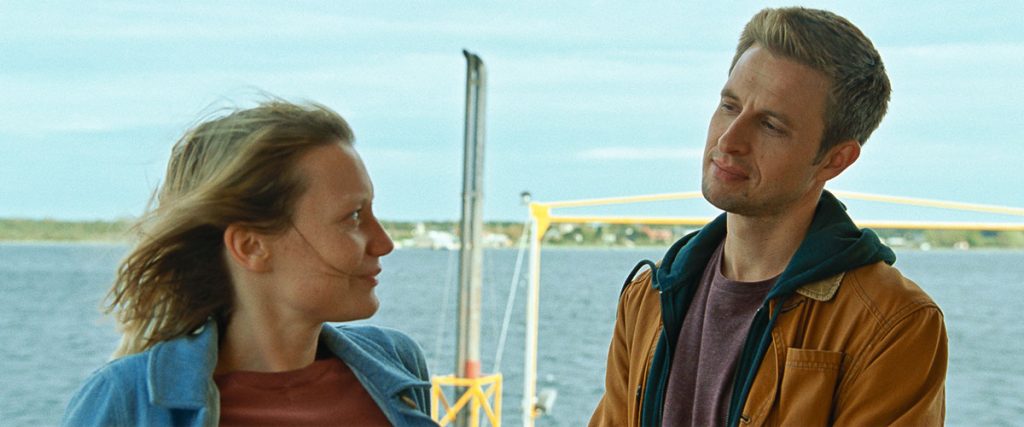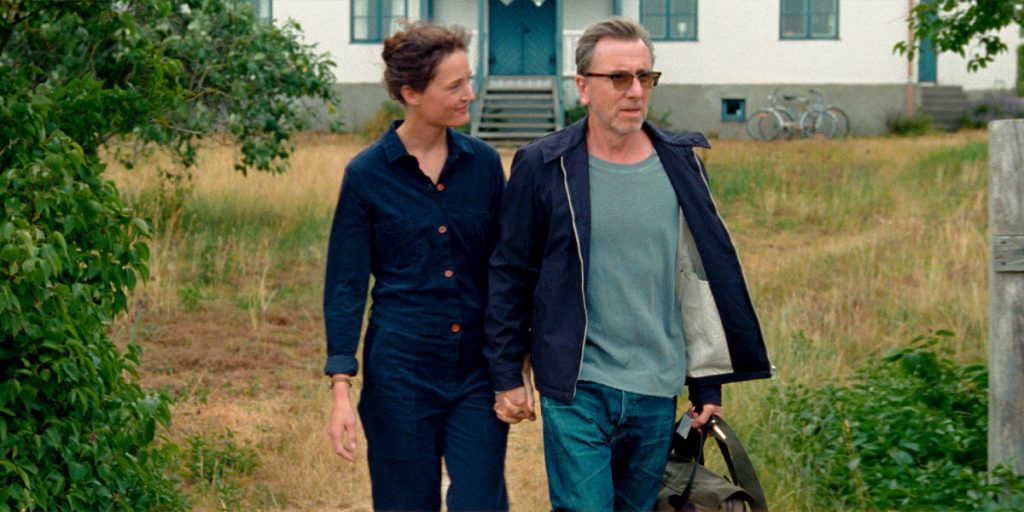Bergman Island is both an authentic look at what it means to love an artist and a deft depiction of one woman’s efforts to come into her own creatively.
In every cinephile, there’s an innate inclination to uncover the “mystery” of the filmmakers behind our favorite movies. What inspired them to craft the chronicles that have captivated us for years and stoked the flames of our love for film? What events and experiences in their life led to their imagining of the features that made them famous? For every aspiring artist, they too follow a similar journey, constructing their own individual identity as a creative by compiling influences from a variety of sources – both near and far – and subsequently finding their own voice. More than anything else, Bergman Island beautifully captures the next step in an artist’s journey – the deviation from these influences and the development of one’s signature “style” – and poignantly portrays this progression via Vicky Krieps’ (Phantom Thread, Old) Chris, a woman caught between the legacies left behind by awe-inspiring auteurs like the titular Ingmar Bergman and the passivity and pretension from a partner who doesn’t regard her as an equal. Writer-director Mia Hansen-Løve’s (Things to Come, Father of My Children) Bergman Island dives deep into this internal drama with fierce frankness, exploring how an artist can only evolve when they make peace with their past and chart their own course as a creator.
The story starts as our central couple – Krieps’ Chris and Tim Roth’s (Pulp Fiction, Reservoir Dogs) Tony – take a trip to the fantastical Fårö island for the summer, where illustrious director Ingmar Bergman lived and shot his most prestigious pictures. Here, the two hope to find inspiration for their own upcoming films as they sharpen their screenwriting skills and struggle to overcome writer’s block, which proves to be especially challenging for Chris. As Tony is completely consumed in his fascination for Bergman’s “brilliance,” he and Chris began to drift apart ever so slightly, with the latter rediscovering her independent spirit, not possessing the same level of love that Tony holds for the acclaimed auteur and instead yearning to be her own innovator instead of an imitation of filmmakers from the past. Additionally, it soon becomes apparent that Tony isn’t at all attuned to Chris’ needs as both a wife and an artist, seeming uninterested in her work and keeping his own stories close to the vest. As Chris starts to share her script – regardless of her husband’s indifference – the lines between reality and fiction begin to blur, with the fraught relationship between her protagonist Amy (Mia Wasikowska, of Alice in Wonderland and Crimson Peak) and her lover Joseph (Anders Danielsen Lie, of The Worst Person in the World and Personal Shopper) drawing parallels to her own plight with Tony, possibly revealing even more truths than she intended.

Hansen-Løve demonstrates an acute awareness of the trials and tribulations that accompany a relationship with an artist when writing for Chris and Tony, capturing both their caustically comedic banter and the far more bitter microaggressions that manifest the longer they live with one another – and when their artistic interests don’t align. For anyone in the film world, it won’t be hard to think of a Tony “type” they’ve encountered as well, as Hansen-Løve suffuses the character with a sickening (and stereotypical) self-centeredness, while simultaneously balancing this attribute with a convincing charm that accounts for Chris’ still continual attraction to his otherwise pernicious personality. With Chris, she is correspondingly careful in her characterization, authentically portraying her creative and relational pains but never allowing this anguish to deprive her of her agency, showing the sly ways she still asserts her power in this pairing via the perceptive story she’s writing and the tragic tale it tells. A saga such as this is nothing new to Krieps, who has previously played a woman romancing a narcissist in 2017’s Phantom Thread, but her Chris is subtler in her defiance than the angsty Alma, keeping a constant – and compelling – control on her emotions. And, despite playing a man who is quite easy to despise, Roth is nevertheless equally efficient in his part, deftly depicting Tony’s dismissiveness with astute apathy.
Wasikowska and Danielsen Lie also bring their all to their portion of the film – which takes up most of the movie’s second half – painting a powerful portrait of youthful passion and its propensity to push us to our emotional limit and cause us to act with reckless abandon, ignoring our better interest. Wasikowska’s Amy, while in a situation comparable to Chris’, is a more theatrical lover, but she still retains a sense of realism when imbuing this role with life, providing Amy with a space to filter through her feelings without judgment and perhaps say the things Chris can’t. Danielsen Lie’s Joseph is as romantically reserved as Roth’s Tony, but there’s a striking sensuality in his performance that sets the two apart, and he comes to represent what’s missing in Chris and Tony’s marriage – and what she may find (or have found) in others. The manner in which this “movie within a movie” fully fits into the central marital conflict is best left unspoiled, but one can say that Hansen-Løve makes use of meta storytelling in a masterfully stirring manner, always keeping us invested in wait for the inevitable connection. It could be said that Amy and Joseph’s anecdote is a bit more conventionally “entertaining” than the film’s Chris-and-Tony-centric first half, as more “action” occurs in these scenes, but both storylines complement each other splendidly by the end, even if the ultimate resolution is a tad too underplayed.
Amidst all these amorous adventures, Hansen-Løve also fills her screenplay with sharp statements on the additional obstacles women face in the film industry, noting how many are often forced to choose between motherhood or moviemaking, while men like Ingmar Bergman can father nine children and yet never be burdened by their presence as his partners always took care of the “child-rearing.” She’s still quite reverential of Bergman – with many fond references to his films sprinkled throughout the story – but she’s not oblivious to the elements of his life that enabled him to work as hard and as often as he did, showing how such progress may not always be possible for female filmmakers (which comes to explain why Chris finds influence elsewhere, in contrast to the Bergman “fanboys” who strive to be his successor but strain to say anything as sage, too beholden to his trademarks and lacking in their own originality). This smart screenwriting shows in both these aforementioned thoughts and the overall subversive structure of Bergman Island, a drama that could have been conventional but appears far more profound as a result of purposeful plotting. Aided by buoyant acting across-the-board from Krieps, Roth, Wasikowska, and Danielsen Lie, Hansen-Løve shines a light on one woman’s artistic revitalization – and how she must reconcile with the weakness of certain relationships to achieve such self-actualization.
Bergman Island opened in select US theaters on October 15, 2021, and was released on digital in the US on October 22. The film will be released in cinemas in the UK on June 3, 2022.

